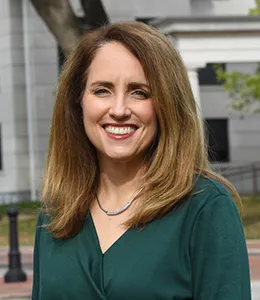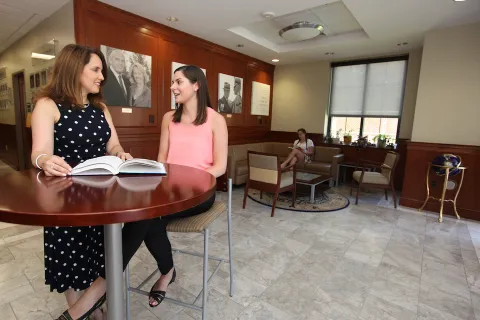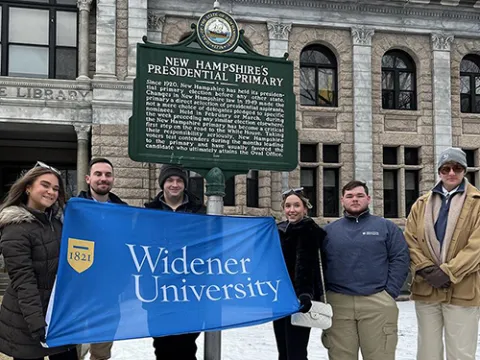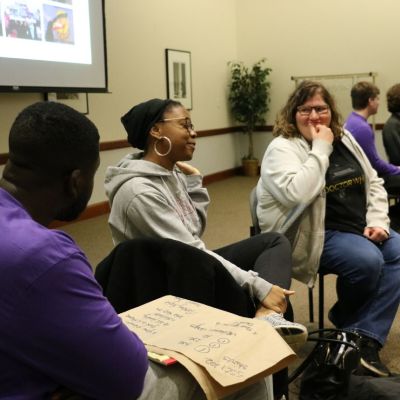Transformative Life Moments: Experiencing Different Points of View

Politics might not be your go-to conversation-starter, especially when words like divisive, chaotic, dysfunctional, corrupt, and polarized come to mind. The Widener political engagement team invites you to consider how politics actually shapes our lives and future careers. Let’s take a step back and see politics through a new lens.
Think about your life and professional goals how politics mobilizes change and policy. How can you, as a Widener student and future alum, contribute to:
- Helping make healthcare accessible for all?
- Examining our borders and think about immigration policy?
- Innovating sustainability practices to improve our environment?
- Building a safe society for underrepresented populations?
Participate in All Widener Has to Offer on Campus & Beyond
Widener offers many opportunities for our students to engage in the world around us. Whether you join a club, take an excursion, talk to your faculty, and participate in athletics: it’s all part of your Widener journey.
College Classroom Discussions – Hearing New Perspectives
Class discussions are one way to experience different points of view. This begins with your ASC 101 course and extends throughout your time at Widener. Your faculty will help create a safe space to facilitate these complex, emotional discussions by establishing expectations and ensuring opinions are welcome—even and especially if classmates have opposite views on the topic.
For instance, in my classroom I want you to feel heard and seen – not judged. The goal of class discussion is to allow all students to understand an issue from multiple points of view. You are not asked to change your beliefs. Through these open, respectful dialogues, you’ll strengthen your own values and understandings and gain insights into diverse viewpoints from an intellectual perspective.
Experience Political Engagement Outside of the Classroom
Meet Presidential Candidates – in person! Dr. Wes Leckrone and I host student trips to New Hampshire for the Presidential Primary Election every four years. Through these trips, you can gain a keen sense of the political issues and see how the professional news media co
vers political events. Here are a few highlights:
- This past February, three political science students and three communication studies students interviewed Nikki Haley, Donald Trump Jr., and Vermin Supreme.
- In 2020, students met Elizabeth Warren, Joe Biden, and Bernie Sanders.
On campus, Dr. Jim Vike and his political science students collaborate students in New Hampshire—reporting live to our campus. Dr. Leckrone and Dr. Vike’s students also facilitate discussion groups after State of the Union Addresses and other key political coverage. Listen to our Far and Widener Podcast episode to learn more.
If you are interested in societal reform, Dr. Lauren Shermer and the criminal justice faculty sponsor a Re-Entry simulation. It's an intense, eye-opening experience that shows what it’s like to leave prison and start a new life reintegrating into society. You’ll gain empathy and a better understanding of the obstacles and judgments people face.
Experiencing difference through Widener trips and excursions is a life-changing way to understand political engagement and the world around us. Participate in our many service-learning opportunities. You will get to know the Chester community and the local area through volunteer hours and reflection. Study Abroad also exposes you to different cultural experiences and languages. Talk to the international students in your classes who may be a little quiet at first.
The “We Are All Widener” mantra is meant to be lived and explored. Move beyond your comfort zone to experience new friends, opportunities, and perspectives.
Keep Exploring & Engaging:
Dr. Angie Corbo, professor and chair of the communications department, teaches courses in public relations, leadership, gendered communication, interpersonal communication, and organizational communication. Her research areas include promoting mental health resources on college campuses, political communication, organizational culture, and ethical guidelines for media coverage in cases of suicide.



